
OHIOVILLE, Pa. — Jacob and Naomi Shepler dream of one day owning their own farm, but for now, renting six acres in their hometown of Ohioville will have to do.
“We’d love to buy a farm some day, but right now it isn’t feasible,” said Jacob, who works full time managing wastewater for a neighboring township.
They have looked into buying land, but it is so expensive, Jacob said. He attributes the recent increase in price to a Shell chemical plant under construction in Potter Township.
The Sheplers, in their mid-20s, aren’t interested in a lifetime of debt. So they are just trying to make it work, Naomi said.“Land prices around here are so high — and have gone even higher since they’ve been making plans for the new Shell plant. It’s crazy,” he said.
Both were active in 4-H as youth, giving them a taste of farming; Jacob raising pigs and Naomi goats.
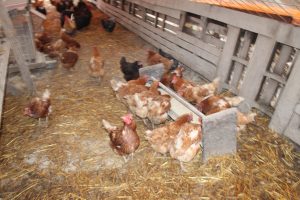
“It has just been a passion ever since I was little,” Jacob said. “I feel like I am doing the right thing, taking care of the land.”
They hope to share this passion with their two sons, Levi, 2, and Luke, 3 months, as they grow.
Their products include chicken and duck eggs, pasture-raised pork, turkey and chicken.
The pork and turkeys they raise from spring to fall, taking orders from their home. In the winter, they don’t get any new pigs or turkeys, which makes less chores in the cold months.
Farmers market
As members of the Beaver County Fruit and Vegetable Growers Association, they sell their products on Saturday mornings in Beaver.
The Sheplers used to attend more farmers markets but have cut back.
Online exclusive
“We just go to the one on Saturday mornings in Beaver; that is all we can get do,” Naomi said, as she glances at their baby who is nodding off as Jacob bounces him.
“We are just trying to get through this season of life,” she said. “It would be great to do this full time, but for now, we are proud to supply the good quality food we can to our community.”
Getting started
They started raising pastured-raised chickens right before they got married in 2014.
The six acres they rent from Naomi’s parents is a step up from their first land rental.
Starting out, they rented land that was about 10 minutes from their home in Ohioville. Each morning and night they would have to travel to the property to take care of their animals. There was no running water, so they hauled 55-gallon drums to the location.
“We used a gravity flow to get the water moving — it was a long, tiring process,” Jacob said.
To improve their operation and learn about best business practices, Naomi participated in the two-year Pennsylvania AgBiz Masters program, graduating in 2016. She admits it was hard to keep up with all the online modules, but she did come away from it inspired to keep better records.
She now keeps detailed records of their inputs and income, putting everything the farm makes back into it, she said.
Marketing
Other than an occasional Facebook ad, the Sheplers have sold most of their products via word of mouth. They have a sign along the road advertising $4 eggs and a refrigerator butted up against the porch where people can retrieve their own eggs and leave the cash.
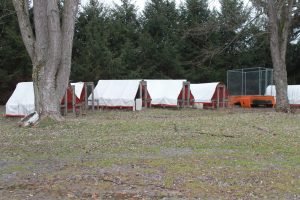
During the farmers market season, they sell 40-50 dozen eggs per week. Year-round, they sell 20-dozen a week to a local health food store, Health Hut.
When asked how they landed that deal, Naomi said, “I just walked in and asked them if they’d like to buy our pastured chickens’ eggs — and they agreed.”
As Jacob works off the farm full time, Naomi has taken the reins in marketing their products.
With no background in web design, Naomi built their website, www.sheplerfamilyfarm.com. She used FatCow web hosting. And, like she does to learn about farming, she learned as she went, reading and watching web tutorials.
Techniques
Right now, they have around 120 laying hens, and the biggest problem is predators, said Jacob, who enjoys hunting and has taken care of some of the predators.
They have built chicken tractors to keep the hens up off the ground at night.
A chicken tractor is essentially a chicken coop on wheels, which lets your poultry forage freely across the land, while protecting them from predators.
It is called a tractor because the scratching and picking at the ground the chickens do, loosens up the first inch or so of earth.
The idea is you move a chicken tractor across your pasture (or backyard) every day, or every few days, so your flock constantly has fresh vegetation to eat.
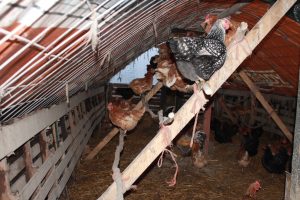
“We’ve tried all sorts of methods; we try see what works best for us,” he said.
“I like to draw and design things,” said Naomi. “It is fun to try new ways to be more efficient.”
She got a lot of her ideas from Polyface Farms in Virginia. “They got us moving — (we) stole their egg mobile ideas.”
Online, they saw the benefits of a hoop house to protect the animals from the weather, and after looking at prices, they decided to build it themselves.
They built the hoop house out of an old billboard tarp and modified pallets. The roosting rails inside are long branches they removed from the nearby forest.
They have a light inside, which is programmed to come on at 4:30 a.m., but it is just one light.
“I’m not sure how many birds we are tricking into believing the sun is up,” Jacob said. “But it sure does help when I come out to feed them in the morning.”
He takes care of the animals in the morning in the 5 o’clock hour, before he goes to work.
Managing chickens
They used to band the chickens’ ankles to know how old they were, different colors representing different years they were hatched. They did not have much luck with the bands staying on in the pasture, so they moved to breeds per year.
Each year they get a different breed, making it easy to know which ones are ready for slaughter. They have about a three-year lifespan of laying.
They lay really well starting around March, getting about 90 percent of the birds laying every day. In the summer’s heat, they lay around 80 percent and then the percentage keeps dropping once the daylight shortens and the temperature drops.
Right now, they estimate about 40 percent or less are laying every day.
People who care
“We are raising these animals for people who really care; who care about where their food comes from and are willing to understand the small farmer — not to compare them to big growers like Tyson,” Jacob said.
They can’t raise the chickens, get them butchered, inspected and packaged for the price Tyson is asking at the grocery store, he said.
“Having the animals on pasture, we are building the soil by moving them everyday, they have fresh air and fresh grass,” Naomi said. “That’s the big difference.”
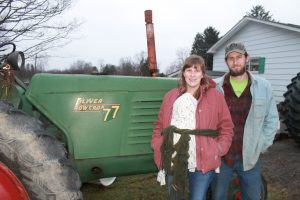
 Online exclusive
Online exclusive
Jacob and Naomi share their advice on getting started.
1. Just try something.
Her advice to getting started, “Just try something, no matter how small. Get started and start learning what works and see if it is something you really want to do.”
2. Focus on presentation.
“The biggest surprise when we got started was the time and effort we need to put into washing the eggs and developing and producing the packaging for the meat,” Naomi said.
Getting the products ready to be presented to the buyers takes time. That is something they didn’t consider when they got started.
Jacob’s advice is to get started learning.
“Just get started — get started with something and you’ll start to learn what works,” he said. “It is a tough road ahead, but it can be done. Look into what you want to do, get some experience before you actually do it, make sure it is what it is cracked up to be.”
3. Consumers are interested in learning.
Another tip the Sheplers would offer is to think about how you will educate customers.
With many people several generations removed from the farm the Sheplers have learned their customers love to learn. They educate their customers about the animals, what they eat, how they live, etc.
“I think sometimes people are more interested in the education than the product,” Naomi said.
Hog training
How do you keep hogs in with an electric fence? Hog training.
Training hogs to respect an electric fence can be trying, but the Sheplers have discovered a trick.
They close the hogs in the hoop house for about a month and put a string of electric fence in the corner.
A hog’s natural reaction when they get shocked is to jump forward, if they are out in the open, this initial reaction sets them free.
Being shocked by the fence and then barging through it.
Inside the hoop house when they get shocked by the electric fence and just forward they run into the corner. It teaches them to move backward when shocked, Jacob said.
After about a month of training the hogs are ready to respect the electric fence in the pasture.
Last year they raised 16 hogs on pasture selling them by the whole or half.



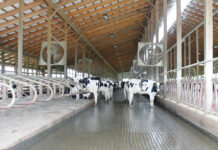


 Online exclusive
Online exclusive


